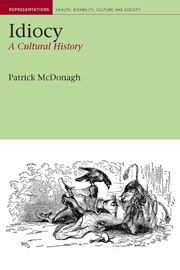Book contents
- Frontmatter
- Contents
- Preface and acknowledgements
- 1 Introduction: idiocy, culture and human relations
- 2 ‘Stripping our own hearts naked’: William Wordsworth and John Wilson read ‘The Idiot Boy’
- 3 A ‘pupil of innocent Nature!’ The wild boy of Aveyron goes to Paris
- 4 Diminished men: masculinity and idiocy
- 5 Essential women: femininity and idiocy
- 6 Holy fools, witty fools, depraved fools: folly, innocence and sin
- 7 History, society, economy: holy fools and idiots come home in nineteenth-century literature
- 8 Barnaby Rudge, idiocy and paternalism: assisting the ‘poor idiot’
- 9 Innocence, philanthropy and economics: the new ‘asylum’ idiot
- 10 Sensational idiocy
- 11 ‘The sins of the fathers’: idiocy, evolution and degeneration
- 12 Danger and degeneracy: the threat of the urban idiot
- 13 The problem of the feeble-minded: the Royal Commission, eugenics and eternal chaos
- Epilogue
- Bibliography
- Index
Epilogue
- Frontmatter
- Contents
- Preface and acknowledgements
- 1 Introduction: idiocy, culture and human relations
- 2 ‘Stripping our own hearts naked’: William Wordsworth and John Wilson read ‘The Idiot Boy’
- 3 A ‘pupil of innocent Nature!’ The wild boy of Aveyron goes to Paris
- 4 Diminished men: masculinity and idiocy
- 5 Essential women: femininity and idiocy
- 6 Holy fools, witty fools, depraved fools: folly, innocence and sin
- 7 History, society, economy: holy fools and idiots come home in nineteenth-century literature
- 8 Barnaby Rudge, idiocy and paternalism: assisting the ‘poor idiot’
- 9 Innocence, philanthropy and economics: the new ‘asylum’ idiot
- 10 Sensational idiocy
- 11 ‘The sins of the fathers’: idiocy, evolution and degeneration
- 12 Danger and degeneracy: the threat of the urban idiot
- 13 The problem of the feeble-minded: the Royal Commission, eugenics and eternal chaos
- Epilogue
- Bibliography
- Index
Summary
Despite efforts to nail down its true being, to define its causes, its significance and its parameters, ‘idiocy’ has remained elusive. John Charles Bucknill admitted in 1873 that, notwithstanding his confidence that he did ‘know what an idiot is’, a definition might be difficult to render all the same. Forty years later, with the Mental Deficiency Act 1913, idiocy was subordinated under the newer banner of ‘mental deficiency’, and while the concepts designated by this new term may have seen their formal legal and medical status solidified thanks to both the Act itself and the enthusiasm of its supporters, in reality these notions remained as slippery, as contentious and as challenging to define as the ‘idiocy’ described by Bucknill. Consequently, these newer notions of mental deficiency did not pass unchallenged. ‘A man is not an imbecile if only a Eugenist thinks so’, G. K. Chesterton argued in his 1922 critique Eugenics and Other Evils:
That which can condemn the abnormally foolish is not the abnormally clever, which is obviously a matter in dispute. That which can condemn the abnormally foolish is the normally foolish. It is when he begins to say and do things that even stupid people do not say or do, that we have a right to treat him as an exception and not the rule. It is only because we none of us profess to be anything more than man that we have authority to treat him as something less.
(Chesterton 1922: 37–38)- Type
- Chapter
- Information
- IdiocyA Cultural History, pp. 332 - 337Publisher: Liverpool University PressPrint publication year: 2008

